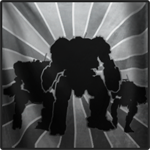 Bishop Steiner, on 10 October 2014 - 11:05 AM, said:
Bishop Steiner, on 10 October 2014 - 11:05 AM, said:
You ever try out SMM? Stock Mech Mondays?
I would love to and I've been meaning to for quite some time. But I live in Europe, so every time I want to participate, I have to ask myself if it's worth wasting the next day because I was up all night gaming.
 Bishop Steiner, on 10 October 2014 - 11:05 AM, said:
Bishop Steiner, on 10 October 2014 - 11:05 AM, said:
I think too many people want to take what appears to be the simplest approach to achieving it, when the system of combat is so multi-layered in MWO, that simplest is seldom actually, best.
Yeah, but you also risk exarcerbating the problem when you keep adding complex mechanics to adjust gameplay. I think the solution is replacing some of the complex systems with new and better systems. For example, there is no easy solution for ECM, LRM, NARC, etc. You can't just say "remove indirect fire" and then it's all good. But you can't add a complex layer of rules on top of what we have already (as PGI tried to do with a million soft counters and modules) to fix the problem either.
Sometimes you just have to start from scratch, or at least take a few steps back.
 Bishop Steiner, on 10 October 2014 - 11:05 AM, said:
Bishop Steiner, on 10 October 2014 - 11:05 AM, said:
-Heat Cap/Scale
-Weapon RoF slowdown (Gauss every 7 seconds, PPC and ac20 every 6, etc)
Would be nice.
 Adiuvo, on 10 October 2014 - 11:28 AM, said:
Adiuvo, on 10 October 2014 - 11:28 AM, said:
What successful competitive game is balanced around the average player?
None, none are.
I really don't see why we can't just say 'learn to torso twist better' to people who complain about TTK. Every game has required counterplay if you want to be successful. Tired of getting ganked in LoL? Buy wards, use flash. Tired of getting CC'd to death in Smite? Buy beads, Magi's. Tired of getting CT cored in MWO? Torso twist
I don't really have experience from those games, but the competitive games I have played have one of these two advantages over MWO, or even both:
1) A better learning curve. Easy to learn, hard to master. You don't have to be an astronaut to figure out how CS:S works, but getting to the top is a slow and steady journey where you improve aim, tactics, knowledge of the maps, 360 no-scope techniques, etc.
2) Tutorials and/or a single player campaign that prepares the player for multiplayer. Imagine StarCraft without any kind of single player campaign, and forcing all new players to learn how all the units work by bitter experience or even just making information available on the forums, as MWO does. If you want to learn about how ECM/NARC/TAG/LRM/PPC interact, you pretty much have to go out and do some research on your own. Now, I'm sure online gameplay in StarCraft 2 is considerably different from how most people play the singleplayer campaign. But at least you get some of the basics. You learn a bit about resource management, which units do what, etc. In MWO, there's none of that. Hence, you get LRM boats face-hugging their target, Kit Foxes repeatedly throwing NARC missiles at targets protected by an ECM bubble, etc.
So yeah, I agree the game needs to be balanced based on what happens at high levels of gameplay. But if this game is going to be harder to play, then PGI also needs to compensate for that somehow. In fact, they should have done that ages ago.
 Adiuvo, on 10 October 2014 - 11:28 AM, said:
Adiuvo, on 10 October 2014 - 11:28 AM, said:
Skill differential to that scale isn't even much of a problem. Lords has around 65 people in it. Maybe 25 of those play competitively on a regular basis. SJR has like 20 people in it entirely. How many people are running into top teams regularly throughout a day? That's easy to answer.
Is the drop-off that significant, that it's not actually worth talking about the other 8 teams in the top 10? Is a hypothetical nr 3 ranked team basically a bunch of casual players?
 Roland, on 10 October 2014 - 08:43 AM, said:
Roland, on 10 October 2014 - 08:43 AM, said:




























